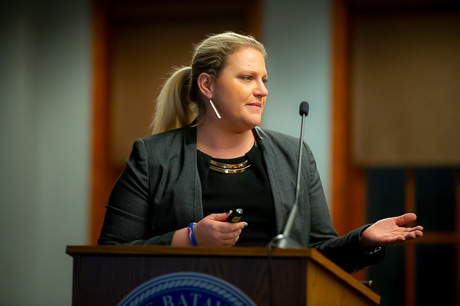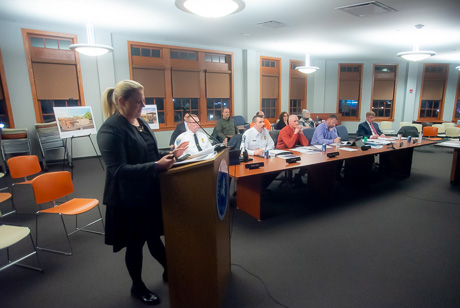City leaders face a tax cap override or 'significant cuts' to 2023-24 budget

City Council has a choice for this year’s budget: vote to override the state-mandated tax cap or prepare to tighten the belt for significant cuts and make ends meet.
That may sound like an ultimatum, but it’s how this year’s 2023-24 budget is panning out so far, City Manager Rachael Tabelski says. She gave a budget presentation to council during Monday’s conference session at City Hall.
Healthcare, inflation, diesel fuel, employee salary and retirement costs are all on the rise, and the tax cap allows a levy increase of $154,000 when what’s needed is $450,000, Tabelski said.
Councilman Bob Bialkowski faced the elephant in the room and asked what happens if the group votes not to override the tax cap, “we raise property taxes?” Or make cuts, Council President Eugene Jankowski Jr. said.
Yes, more likely it would be the latter, Tabelski said: “That would mean significant cuts,” she said to The Batavian after the meeting.
“The tax cap is an arbitrary formula given by the state. You know, the only thought this year was that we can raise this revenue and continue the level of services that have expanded slightly in the last year or so. We have a full-time parking and recycling officer, a full-time ordinance officer, another firefighter that was contractually obligated through a contract signed before I was here,” she said. “To cover those costs, plus health care's up $457,000, retirement costs are up $300,000 … I would say this is this year's request, that the city would do everything in its power to maintain under the tax cap in the future.”

That means that, hopefully, this won’t be a recurring ask, she said. City Council would have to approve the measure by at least a 60 percent yes vote.
Can department heads dig deeper and reduce their budget requests?
“This is the bare bones budget. We've already gone through that process of every department, and they present to me, obviously, what they'd like to see in the budget, and then we cut that back significantly to get to this point,” she said. “This is to maintain the level of employees we have at fair wages and to make sure we can pay social security and health care for those employees. Those are the main drivers, plus the inflationary prices of gas, electric, diesel, fuel, and supplies and materials. So they've already done their value engineering, as we call it. But again, council has budget work sessions that go right through, line by line, each expense and discuss it. And there certainly could be changes that come from that.”
Council members will be going through the budget during the next several weeks to ask questions, make suggestions, and see where other cuts might be made. The one area where Tabelski does not recommend taking from is the unassigned fund balance. That fund is best used as a savings account for future use.
She shared that the fund has grown a bit from an overdue payment from Seneca Power Partners, which had been in arrears with its taxes.
“I will say that we had a payment from Seneca Power of penalties and interest on the tax payments. So my hope is that will really help our unassigned fund balance when we get to the end of the audit year in August,” she said. “But when I do the budget, I don't know that number. I have no way to project what that number is until we get into the audit after the budget books close.”
Other parts of the budget include an extra $275,000 “to reserve funds to prepare to bond for the police facility,” she said.
“So right now, we're putting money into reserves, like our savings, so that we're able to bond when the time comes with the hopes of not having to raise property taxes, and being able to do it within those reserve funds we're putting away right now,” she said. “Kind of like when your car payment rolls off, and you put it into your savings account, and then you lease or buy a new car. You can then use that money in your savings account to pay that new car payment.”
Despite the ominous term of "override the tax cap," the actual tax rate would remain the same, Tabelski said. That would be $8.94 per $1,000 assessed value. She is proposing to raise the water rate by 30 cents.
Council members will be discussing the budget this month and into February before a public hearing on Feb. 27.
Top Photo: City Manager Rachael Tabelski gives an overview of the past year and 2023-24 budget during City Council's conference session Monday at City Hall; shown with department heads nearby, who have already submitted their "bare bones" budgets for consideration. Photos by Howard Owens.
